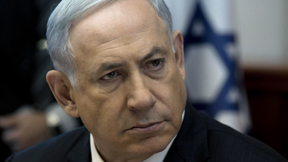 JERUSALEM: Israeli Prime Minister Benjamin Netanyahu has clinched an 11th-hour deal with a right-wing party to form a hard-line coalition government that could pose a major challenge to any global initiative to break the logjam in peace talks with the Palestinians.
JERUSALEM: Israeli Prime Minister Benjamin Netanyahu has clinched an 11th-hour deal with a right-wing party to form a hard-line coalition government that could pose a major challenge to any global initiative to break the logjam in peace talks with the Palestinians.
Netanyahu, 65, seemed visibly tense as coalition talks with the Bayit Hayehudi (Jewish Home) party identified with hardline settlers extended till late evening and a deal was agreed just 90 minutes before the midnight deadline.
The Prime Minister made major concessions to ensure a wafer-thin majority of 61 members in a 120-member Israeli parliament – Knesset.
“Sixty-one is a good number, and 61-plus is an even better number,” Netanyahu said.
“But it starts at 61 and we will begin. We have a lot of work ahead of us,” he added.
In return for Jewish Home’s support, Netanyahu bowed to its demand for the justice minister portfolio, a post critical to the smooth passage of cabinet-approved legislation to parliament for ratification.
Netanyahu informed President Reuven Rivlin that, “I am honored to notify you I have succeeded in forming a government, which I would like to present to parliament as soon as possible.”
President Reuven Rivlin had given Netanyahu a two-week extension after he failed to muster a coalition during the 28 days allotted time after majority of the elected members had expressed support for him to lead the next government.
Netanyahu’s ruling Likud party had emerged the single largest party winning an impressive 30 seats on March 17 amid controversial remarks that sparked international criticism and evoked accusations of racism against the hawkish leader.
During his campaign, he attacked the minority Arab population saying they were voting in hordes to keep him out of power and were being backed by foreign funding.
The new government comprising only of right-wing parties is likely to be at loggerheads with close ally US which has sought firm commitments from Netanyahu to the existing two-state framework.
The right-wing parties included in the new coalition support increased building of West Bank Jewish settlements and oppose peace moves with the Palestinians, something that could isolate Israel in the international community as several European nations have started to accord recognition to a Palestinian state. Controlling just 61 of 120 parliamentary seats, the narrow coalition could also struggle to press forward with a domestic agenda.
“I am sure that nobody is surprised that the negotiations continued with all the factions and nobody is surprised it ended at the time it did,” Netanyahu said late last night.
Vowing to install “a strong and stable government for the people of Israel” by next week, he also hinted to bring in additional partners leading to speculations that he may want to court the centrist Zionist Union party which won 24 seats to form a wide based government.
The coalition talks received a huge jolt earlier this week when Foreign Minister Avigdor Lieberman, a longtime ally of Netanyahu, unexpectedly stepped down and announced that his secular nationalist Yisrael Beitenu party was joining the opposition because of unreasonable concessions being given to ultra-orthodox parties around state funding of religious education and exemption from national duty.
This opened an opportunity for Bayit HaYehudi leader Naftali Bennett to run a hard bargain and he suceeded in getting the important Justice Ministry portfolio for his party under his conditions.
“I congratulate you on completing the formation of the government. I have received your letter of confirmation, and look forward to the convening of the Knesset as soon as possible, to approve the government,” Rivlin said after Netanyahu informed him of having gathered enough support.
Zionist Union leader Isaac Herzog called the new coalition “a national failure government” describing it as “an embarrassing farce” and “the narrowest (government) in Israel’s history.”
Political analysts predicted a difficult path ahead for the new Netanyahu led government given the internal fissures within the right-wing bloc that could stall every major policy initiative. -PTI





